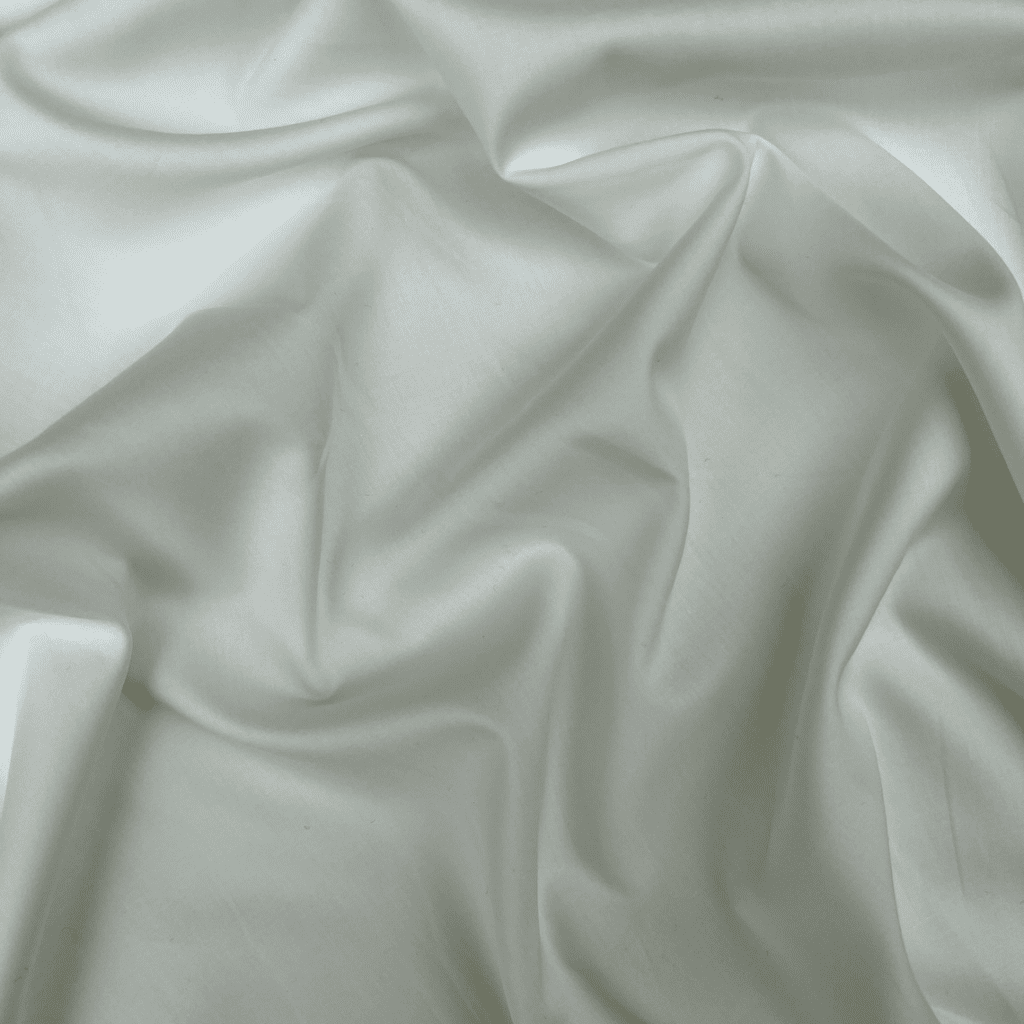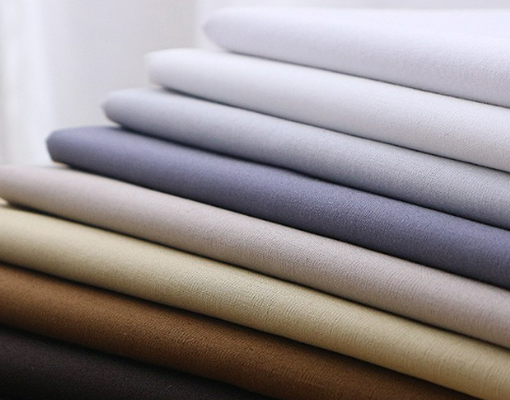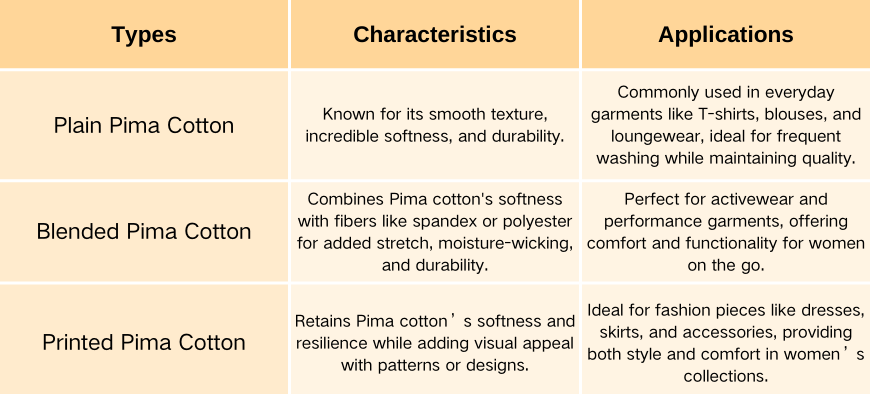Pima cotton fabric is renowned for its exceptional softness, durability, and premium quality, making it a favorite in women’s fashion.
At Jinfeng Apparel, we are dedicated to sourcing the finest Pima cotton to create garments that offer both luxury and comfort. Known for its extra-long fibers, Pima cotton stands out for its smooth texture and long-lasting performance, perfect for crafting elegant yet practical apparel.
In this blog, we explore the unique qualities of Pima cotton, its versatile applications in women’s fashion, and why it remains a sustainable choice for eco-conscious consumers.

What is Pima Cotton Fabric?
Pima cotton fabric is a premium textile made from extra-long staple (ELS) cotton fibers, which are known for their exceptional softness, strength, and luxurious feel. These longer fibers give Pima cotton its smooth texture, durability, and resistance to pilling, making it an ideal material for high-quality women’s fashion. It is often chosen for garments that require both comfort and longevity.

Origin and Source of Pima Cotton Fibers
Pima cotton is cultivated primarily in regions like the United States, Peru, and Australia. The cotton fibers are handpicked to maintain their superior quality, ensuring that the fabric remains smooth and strong. This extra care during harvesting and the inherent properties of the fibers contribute to Pima cotton’s premium status in the fashion world.
Historical Significance and Modern Usage
Historically, Pima cotton was named after the Pima people in the U.S. Southwest, who played a significant role in its early cultivation. Today, it is a popular fabric in women’s fashion, known for its luxurious touch and durability. Pima cotton is widely used in high-end apparel, including dresses, tops, and loungewear, offering breathable, soft, and long-lasting garments.
Pima Cotton Fabric Today
As sustainability becomes more important in fashion, Pima cotton continues to be a sought-after fabric due to its natural, biodegradable fibers and environmentally friendly production. At Jinfeng Apparel, we carefully source high-quality Pima cotton to craft women’s garments that combine elegance, comfort, and durability, while meeting the demands of eco-conscious consumers.
What Makes Pima Cotton Fabric Unique?
Pima cotton fabric is celebrated for its luxurious qualities, making it a preferred choice in high-end women’s fashion.
Its blend of exceptional softness, strength, and breathability sets it apart from other cotton fabrics, allowing for the creation of premium, long-lasting garments that prioritize both comfort and style.
Key Characteristics and Qualities
- Softness and Comfort: Pima cotton is renowned for its incredibly soft texture, owing to its extra-long staple fibers. These smooth, fine fibers give the fabric a silky, luxurious feel that is gentle on the skin, making it ideal for women’s fashion items like dresses, blouses, and loungewear.
- Durability: Thanks to the longer fibers, Pima cotton is significantly more durable than regular cotton. The fabric resists pilling, fraying, and tearing, ensuring that garments made from Pima cotton retain their quality and appearance even after frequent washing and wear.
- Breathability: Pima cotton is naturally breathable, making it a perfect choice for garments worn in warm climates or during active pursuits. The fabric wicks moisture away from the body, keeping the wearer cool and comfortable, making it a popular option for summer collections and activewear.
- Hypoallergenic: Pima cotton is less likely to cause skin irritation or allergies due to its natural, chemical-free fibers. Its softness and gentle texture make it suitable for people with sensitive skin, providing a comfortable and irritation-free wearing experience.

Comparison with Other Fabrics
- Pima Cotton vs. Regular Cotton: Pima cotton offers superior softness and durability compared to regular cotton. While regular cotton is widely used, it lacks the long-lasting resilience and luxurious feel of Pima cotton.
- Pima Cotton vs. Polyester: Although polyester is durable and affordable, it cannot match the breathability and comfort of Pima cotton. Pima cotton’s moisture-wicking properties make it more suitable for women’s fashion that requires both style and comfort, particularly in warmer climates.
- Pima Cotton vs. Egyptian Cotton: Both Pima and Egyptian cotton are known for their high quality, but Pima cotton is often considered more durable due to its stronger fibers. Egyptian cotton is prized for its sheen and slightly longer fibers, but Pima cotton is favored for its balance of softness, strength, and versatility.
Pima cotton’s unique combination of luxury, durability, and breathability makes it a top choice for women’s fashion.
At Jinfeng Apparel, we integrate Pima cotton into our collections to create garments that provide an unmatched level of comfort and longevity, ensuring that our designs remain timeless and functional for our clients.
How is Pima Cotton Fabric Made?
The production of Pima cotton fabric is a meticulous process designed to maintain the softness, strength, and luxurious qualities of its extra-long staple fibers. At Jinfeng Apparel, we focus on utilizing high-quality Pima cotton to craft premium garments that are durable and comfortable for women’s fashion.
Production Process
- Cultivation: Pima cotton is grown in regions with warm climates, primarily in the United States, Peru, and Australia. These regions provide the perfect conditions for cultivating the cotton’s long fibers. To preserve the fiber’s integrity, Pima cotton is handpicked, preventing damage and ensuring a smooth and resilient texture.
- Ginning: Once harvested, the cotton goes through the ginning process, where the fibers are separated from the seeds. This process ensures that the extra-long fibers remain intact, contributing to the fabric’s soft and luxurious feel.
- Spinning: The cleaned fibers are spun into fine yarn, which is crucial for creating fabric that retains its softness, strength, and durability. Fine spinning ensures that the yarn remains smooth and uniform, resulting in a refined texture perfect for premium women’s fashion garments.
- Weaving or Knitting: After spinning, the yarn is woven or knitted into fabric. Woven Pima cotton is used for structured garments like blouses and shirts, while knitted fabric is softer and stretchier, ideal for casual wear such as T-shirts, tops, and loungewear.
- Finishing: In the finishing stage, the fabric undergoes treatments such as dyeing and softening. These treatments enhance the fabric’s appearance and texture while ensuring its long-lasting quality. The result is a fabric that feels luxurious to the touch and maintains its softness and durability through repeated wear and washes.

Regions Known for Pima Cotton Production
- United States: The U.S. is one of the largest producers of Pima cotton, particularly in states like California and Arizona. The ideal climate and advanced agricultural techniques ensure the production of high-quality cotton with strong, long fibers.
- Peru: Known for producing some of the softest Pima cotton, Peru benefits from its coastal regions’ optimal growing conditions, giving the cotton an exceptional sheen and texture.
- Australia: With a focus on modern farming techniques, Australia is another significant producer of Pima cotton, cultivating long-staple fibers that are highly durable and used in premium apparel.
Jinfeng Apparel uses only the finest Pima cotton to ensure that our women’s fashion collections offer unparalleled comfort, longevity, and elegance.
What Are the Types of Pima Cotton Fabric?
Pima cotton fabric comes in various forms, each offering unique characteristics suited to different fashion and textile applications.

At Jinfeng Apparel, we carefully select and work with different types of Pima cotton fabric to create high-quality, stylish garments that meet the needs of today’s fashion-conscious women.
Plain Pima Cotton
Plain Pima cotton is prized for its smooth texture and incredible softness. This type of fabric is commonly used in everyday garments like T-shirts, blouses, and loungewear. Its durability makes it ideal for clothing that requires frequent washing while maintaining its luxurious feel and longevity.
Blended Pima Cotton
Blended Pima cotton combines the premium softness of Pima with other fibers like spandex or polyester to enhance the fabric’s stretch, moisture-wicking abilities, and overall durability. These blends are perfect for activewear and performance garments, offering both comfort and functionality for women on the go.
Printed Pima Cotton
Printed Pima cotton is used to create visually striking garments featuring patterns or designs. This type of fabric retains the luxurious qualities of Pima cotton, such as its softness and resilience, while adding an aesthetic element to fashion pieces like dresses, skirts, and accessories. It’s ideal for women’s fashion collections that emphasize both style and comfort.
Each of these Pima cotton fabric types offers unique benefits, making it a versatile and valuable material in women’s fashion.
Whether for casual wear, performance apparel, or high-end fashion, Pima cotton continues to be a favored choice for its quality, comfort, and elegance.
How is Pima Cotton Fabric Used in Women’s Fashion?
Pima cotton fabric is highly valued in women’s fashion due to its premium qualities such as softness, breathability, and durability. At Jinfeng Apparel, we utilize Pima cotton in various applications to create stylish and comfortable garments that meet the needs of modern women.
Casual Wear
Pima cotton is perfect for casual wear like T-shirts, tops, and everyday dresses. Its smooth, soft texture provides ultimate comfort, while its breathability makes it ideal for warm weather or all-day wear. These qualities make Pima cotton a go-to fabric for casual garments that prioritize both comfort and style.
Formal Wear
Pima cotton’s refined appearance and natural sheen make it suitable for more formal attire, such as blouses, skirts, and tailored dresses. Its durability ensures that these garments maintain their structure and sophistication over time, making it a great choice for professional and upscale collections.
Loungewear and Sleepwear
Due to its softness and comfort, Pima cotton is frequently used in loungewear and sleepwear collections. Women’s pajamas, robes, and loungewear crafted from Pima cotton provide a luxurious feel while maintaining breathability, ensuring comfort during rest or relaxation.
Activewear
Blended Pima cotton fabrics are often used in activewear, offering both flexibility and moisture-wicking properties. These blends allow women to stay comfortable and dry during workouts, making Pima cotton a popular choice for sports bras, leggings, and other activewear pieces that combine performance with a soft, natural feel.
Pima cotton fabric’s versatility and premium quality make it an essential material in women’s fashion. From casual everyday wear to formal and active apparel, Pima cotton offers the perfect balance of comfort, durability, and elegance for modern women’s wardrobes.
How Much Does Pima Cotton Fabric Cost?
The cost of Pima cotton fabric depends on factors such as quality, type, and production region. Understanding these factors is essential for making informed sourcing decisions for women’s fashion manufacturing.
Pima Cotton Fabric Costs in the United States
- Basic Pima Cotton Fabric: Prices for basic Pima cotton range from $15 to $30 per yard. This fabric is known for its softness and durability, making it a popular choice for casual garments such as T-shirts and dresses.
- Premium Pima Cotton Fabric (Blends, Printed): Premium versions, including blends and printed fabrics, generally cost between $30 to $60 per yard. These options offer enhanced softness, longevity, and are typically used in high-end fashion collections.

Pima Cotton Fabric Costs in China
- Basic Pima Cotton Fabric: In China, basic Pima cotton fabric is more competitively priced, ranging from $10 to $20 per yard. Lower labor and production costs allow for affordability, making China a prime sourcing location for manufacturers.
- Premium Pima Cotton Fabric: Premium Pima cotton in China, including blended or printed varieties, usually ranges from $20 to $45 per yard. Despite the lower costs, these fabrics retain excellent quality, making them suitable for luxury garments.
Factors Influencing Pima Cotton Fabric Prices
- Type of Pima Cotton: Premium blends or printed versions are more expensive due to their advanced qualities, including durability and design appeal.
- Production Location: Manufacturing in regions like China tends to be less expensive than in countries like the U.S., affecting the overall cost.
- Certifications: Organic or eco-certified Pima cotton fabric is often priced higher due to the sustainability and ethical production standards required.
Comparing Pima Cotton Fabric Prices: U.S. vs. China
Pima cotton fabric in China is typically 20% to 40% cheaper than in the U.S., driven by differences in labor costs and production efficiencies. This cost-effectiveness makes China a strong choice for fashion manufacturers seeking premium fabrics at competitive prices.
By leveraging cost-effective sourcing from trusted suppliers, Jinfeng Apparel can deliver high-quality Pima cotton garments that combine luxury with sustainability.
How Does Pima Cotton Fabric Impact the Environment?
Pima cotton fabric offers both positive and negative environmental impacts, depending on the farming methods and production processes used. As a women’s fashion manufacturer, Jinfeng Apparel is committed to understanding these impacts to make informed, sustainable choices.
Positive Environmental Impacts
- Renewable and Biodegradable: As a natural fiber, Pima cotton is biodegradable, meaning it breaks down naturally over time, unlike synthetic fabrics that contribute to microplastic pollution. This makes Pima cotton a sustainable option for eco-conscious consumers seeking environmentally friendly fashion.
- Water-Saving Techniques: Many Pima cotton farms implement water-saving techniques, such as drip irrigation, which reduces water consumption. These advanced farming practices are particularly important in water-scarce regions, making Pima cotton farming more sustainable.

Negative Environmental Impacts
- Water Usage: Like other cotton varieties, Pima cotton requires substantial water for irrigation, which can put pressure on water resources in drier climates. To minimize this environmental strain, responsible water management is essential throughout the farming process.
- Ecosystem Disruption: Large-scale cotton farming can disrupt local ecosystems, leading to soil depletion and loss of biodiversity if not carefully managed. However, sustainable agricultural practices such as crop rotation and organic farming help reduce these negative effects.
Sustainable Practices in Pima Cotton Production
- Water Management: Efficient water management systems, such as drip irrigation, are key to minimizing water usage and reducing the environmental footprint of Pima cotton cultivation.
- Sustainable Farming: Implementing sustainable farming practices, including crop rotation and integrated pest management, helps maintain soil health, reduce chemical inputs, and support biodiversity.
- Certifications: Certifications like GOTS (Global Organic Textile Standard) and OEKO-TEX® ensure that Pima cotton is produced using eco-friendly and ethical practices. These certifications provide assurance that the fabric meets high environmental and social standards.
By prioritizing sustainable practices, Pima cotton can be a responsible choice in women’s fashion, aligning with the growing demand for eco-friendly and durable materials. At Jinfeng Apparel, we source certified Pima cotton to ensure our garments reflect these values.
Ensuring Pima Cotton Fabric Quality and Certification
At Jinfeng Apparel, ensuring the highest standards of quality and sustainability for Pima cotton fabric is vital to delivering premium women’s fashion that combines luxury with eco-conscious practices.
Key Quality Indicators
- Fiber Strength and Durability: Pima cotton is known for its extra-long staple fibers, which provide exceptional strength and longevity. At Jinfeng Apparel, we meticulously select the finest Pima cotton to ensure that our garments remain soft and durable, even after frequent wear and washing, making them a reliable choice for high-end women’s fashion.
- Breathability and Comfort: Pima cotton’s natural breathability and moisture-wicking properties make it ideal for comfortable wear across different seasons. Whether in casual or luxury collections, its softness and ability to regulate body temperature ensure that our garments offer the highest level of comfort for the wearer.
- Aesthetic Appeal: Pima cotton’s smooth texture and natural sheen enhance the overall aesthetic of any garment. It lends a refined, polished appearance to both everyday and formalwear, making it a versatile fabric in women’s fashion collections.

Certifications and Sustainability
- Global Organic Textile Standard (GOTS): At Jinfeng Apparel, we source Pima cotton that is GOTS-certified, ensuring that the cotton is grown organically without harmful chemicals. This certification ensures the cotton adheres to the highest environmental and social standards, from organic farming practices to ethical labor conditions.
- OEKO-TEX® Standard 100: Our Pima cotton fabrics meet OEKO-TEX® Standard 100, certifying that they are free from harmful substances and safe for direct skin contact. This certification provides our customers with confidence that the fabric they wear is not only luxurious but also safe for their health.
- ISO Standards: We comply with ISO standards for quality management and environmental responsibility throughout our production process. From sourcing raw Pima cotton to finishing the final garments, we ensure that each step meets international quality benchmarks, reinforcing our commitment to sustainability and consistency.
By maintaining these globally recognized certifications and implementing strict quality control measures, Jinfeng Apparel ensures that our Pima cotton garments not only offer elegance and comfort but also align with the growing demand for sustainable and ethically produced fashion.
Explore our fabric catalog to learn more about different types of fabrics.





